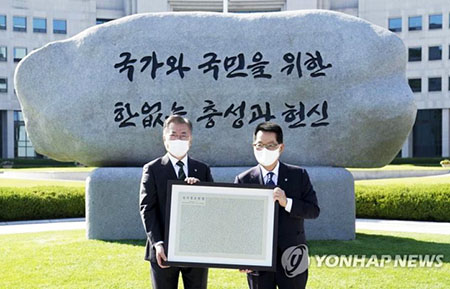by WorldTribune Staff, June 7, 2022
In June of last year, the leftist administration of President Moon Jae-In honored notorious communist spy Shin Young-Bok.
Moon was even on hand himself when Shin was honored as his calligraphy was enshrined on a large rock outside of Seoul’s National Intelligence Service (NIS), which is the South’s version of the U.S.’s CIA.

Shin Young-Bok was sentenced to life in prison by South Korea’s Supreme Court for violating the National Security Act for his anti-state espionage activities. After 20 years in prison, he was granted special parole in 1988 and released.
“Imagine a statue of Aldrich H. Ames at the entrance of the CIA,” Tara O noted in a June 6 analysis for East Asia Research Center. “Or a memorial of Robert Hanssen at the entrance of the FBI. Does it make sense to establish tributes to spies who damaged U.S. national security, especially in front of the CIA and FBI headquarters?”
Shin “was crucial to the formation and subversive operations of the Unification Revolutionary Party (URP), an underground organization and an extension of North Korea’s Workers’ Party,” Tara O noted.
Uncovered in 1968 by the South Korean government, the URP case was the most significant espionage case on the Korean Peninsula in the 1960s.
In his welcome address at the reception of the Pyeongchang Winter Olympics in 2018, Moon had stated that Shin Young-Bok is the ideologist he admired the most.
Kim Moon-Soo, former governor of Gyeonggi and former labor activist, criticized Moon, stating, “Shin Young-Bok is clearly a spy, and I don’t think the president of our country should say to the whole world that he respects the ideology (Marxism-Leninism-Kim Il-Sungism) of such a person.”
Professor Emeritus Yang Dong-An also stated that Shin Young-Bok, who Moon admired, was thoroughly a communist based on his writings and actions. “This was one of the points emphasized in testimony at a trial in which Moon Jae-In sued Koh Young-Ju, because Koh called Moon a communist,” Tara O noted.
One Korea Network noted after last year’s ceremony honoring Shin:
Shin is considered a liberal intellectual among South Koreans on the left, but conservatives emphasize that he was a criminal who was involved in the so-called Unification Revolutionary Party (Tonghyuk-dang) incident in 1968. The case refers to the biggest spy scandal in South Korean history.
Central to the scandal, South Korean revolutionary leftist Kim Jong-tae illegally visited North Korea four times and received funding from North Korea to form the People’s Revolutionary Party. The five main criminals involved in the plot, including Kim Jong-tae, were apprehended in South Korea and sentenced to death, and 158 others were arrested. Shin Young-bok was one of the key academic and cultural figures who were recruited by Kim Jong-tae, who planned an armed uprising and overthrow of the government.
Shin was sentenced to life in prison for violating the National Security Act. He was released in 1988 after 20 years in prison after writing a letter that declared he had undergone an ideological conversion. However, he later changed his words and said “I never changed my ideology or betrayed my comrades.”
About . . . . Intelligence . . . . Membership
